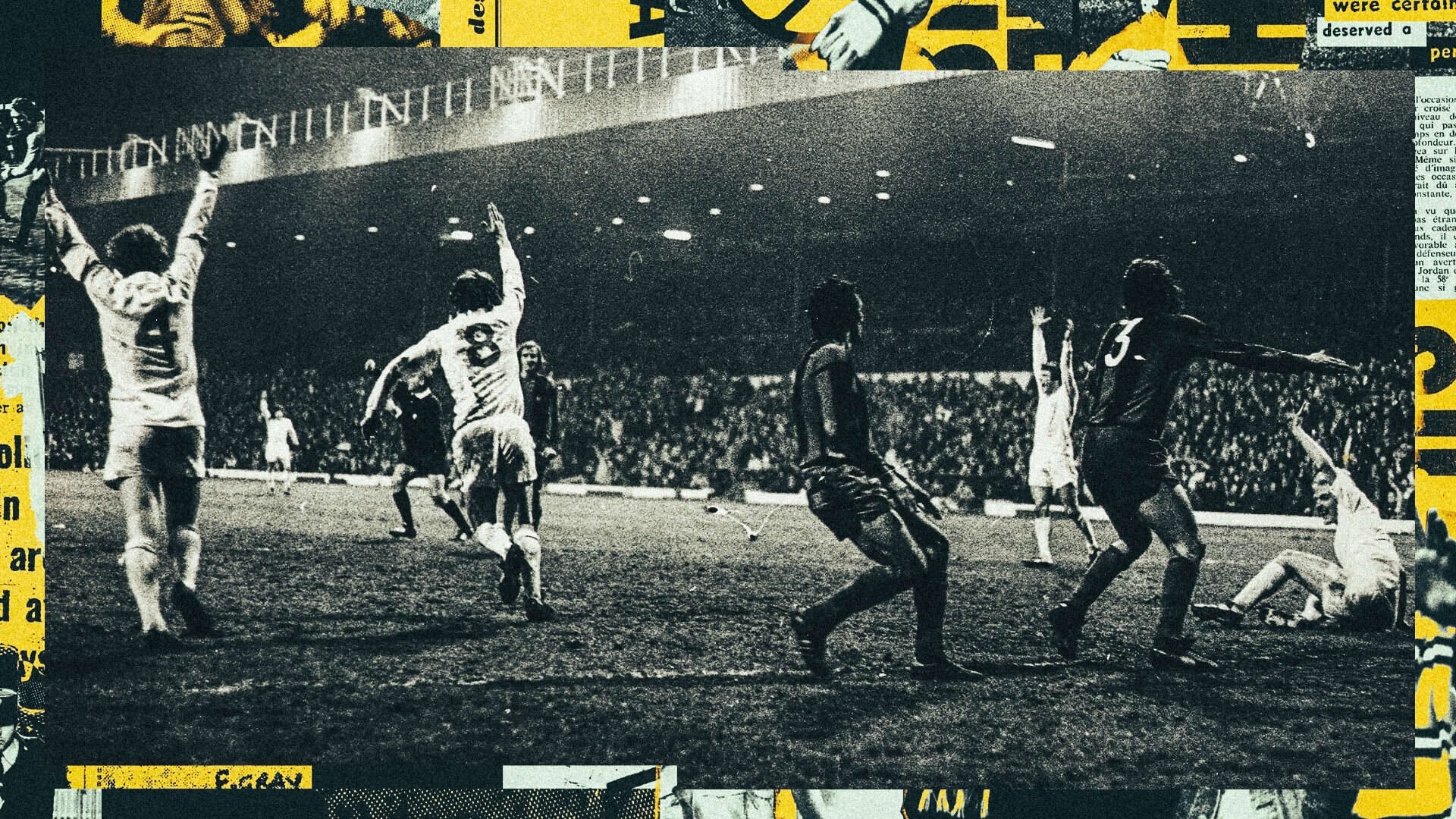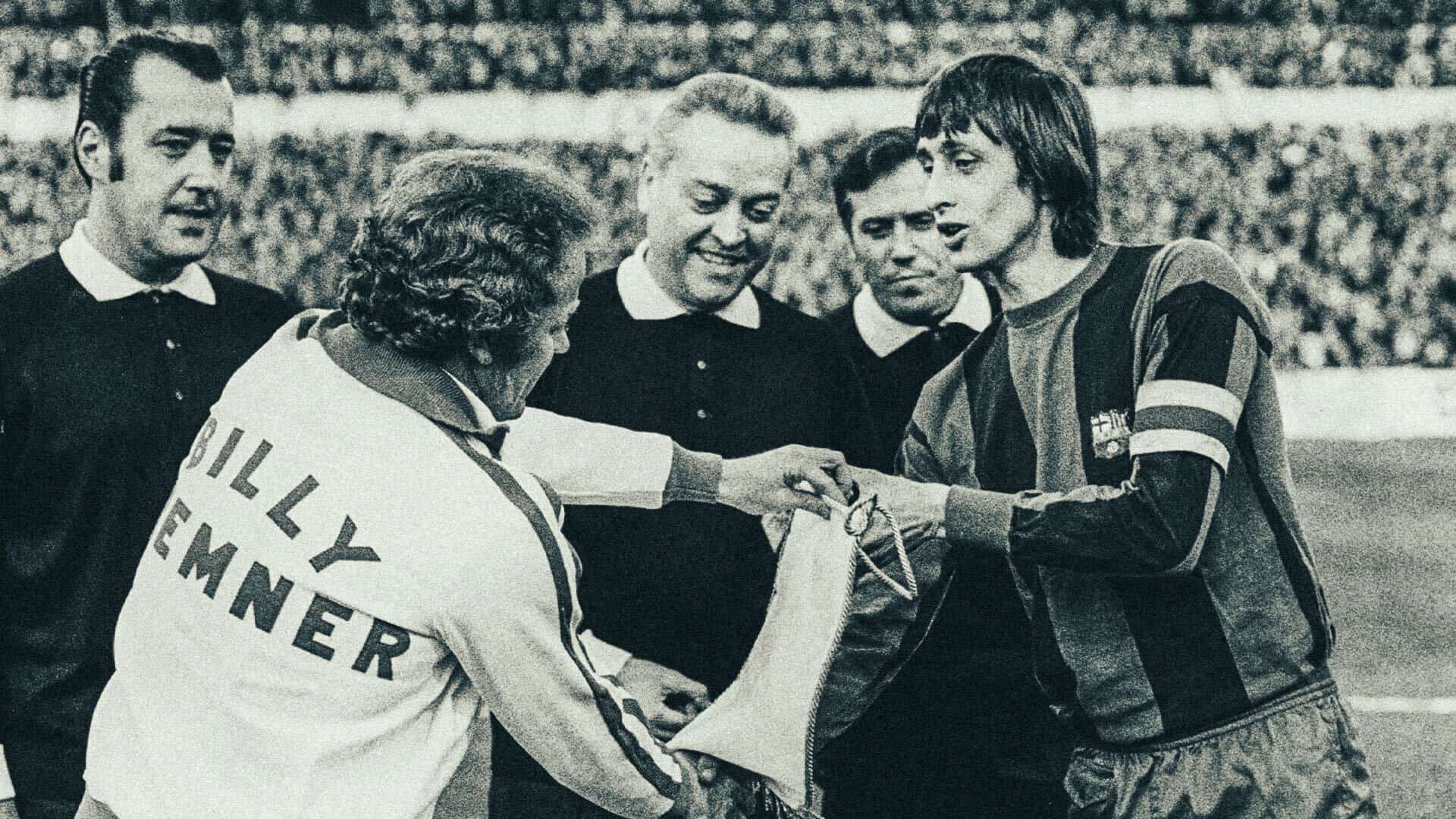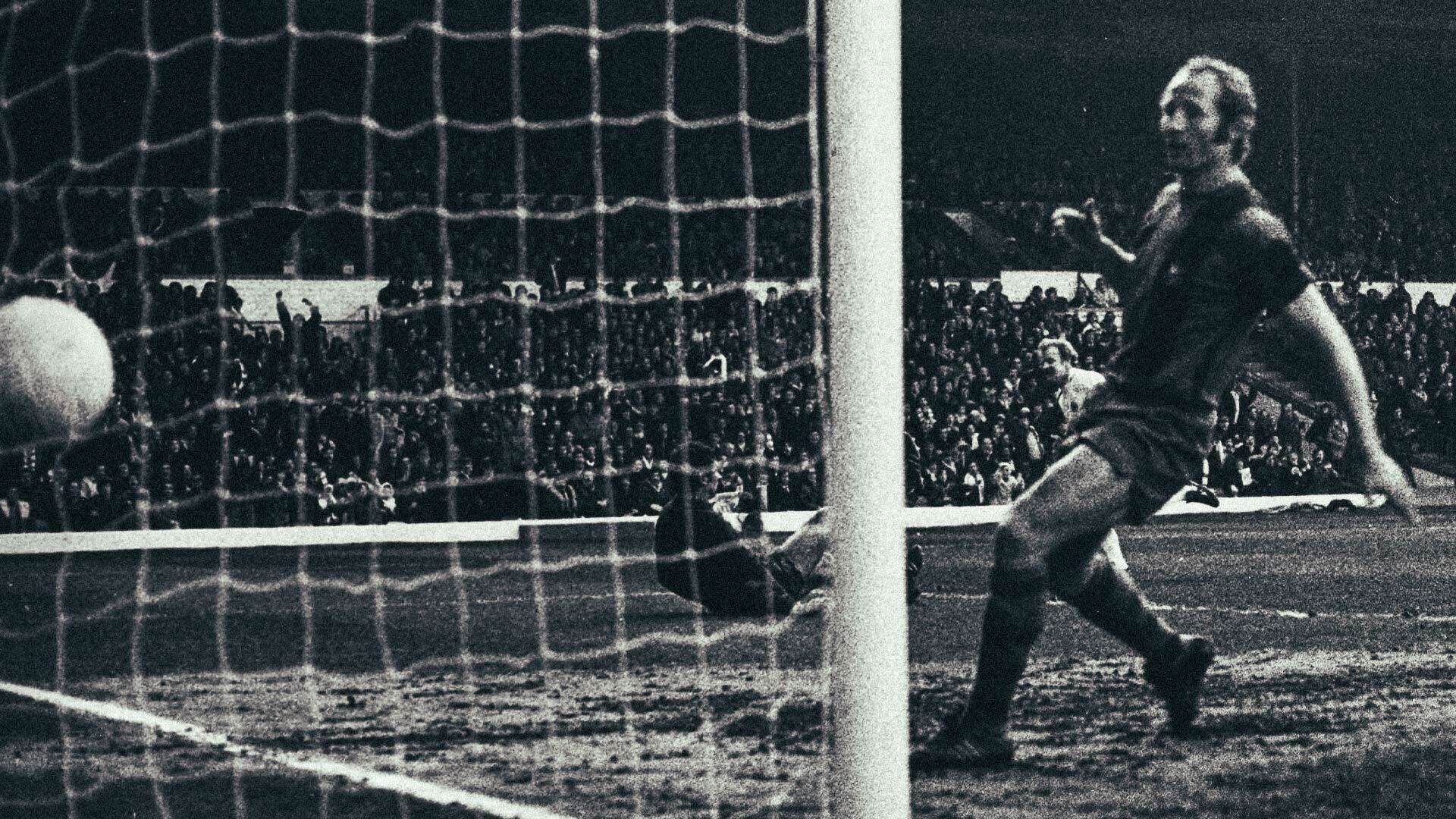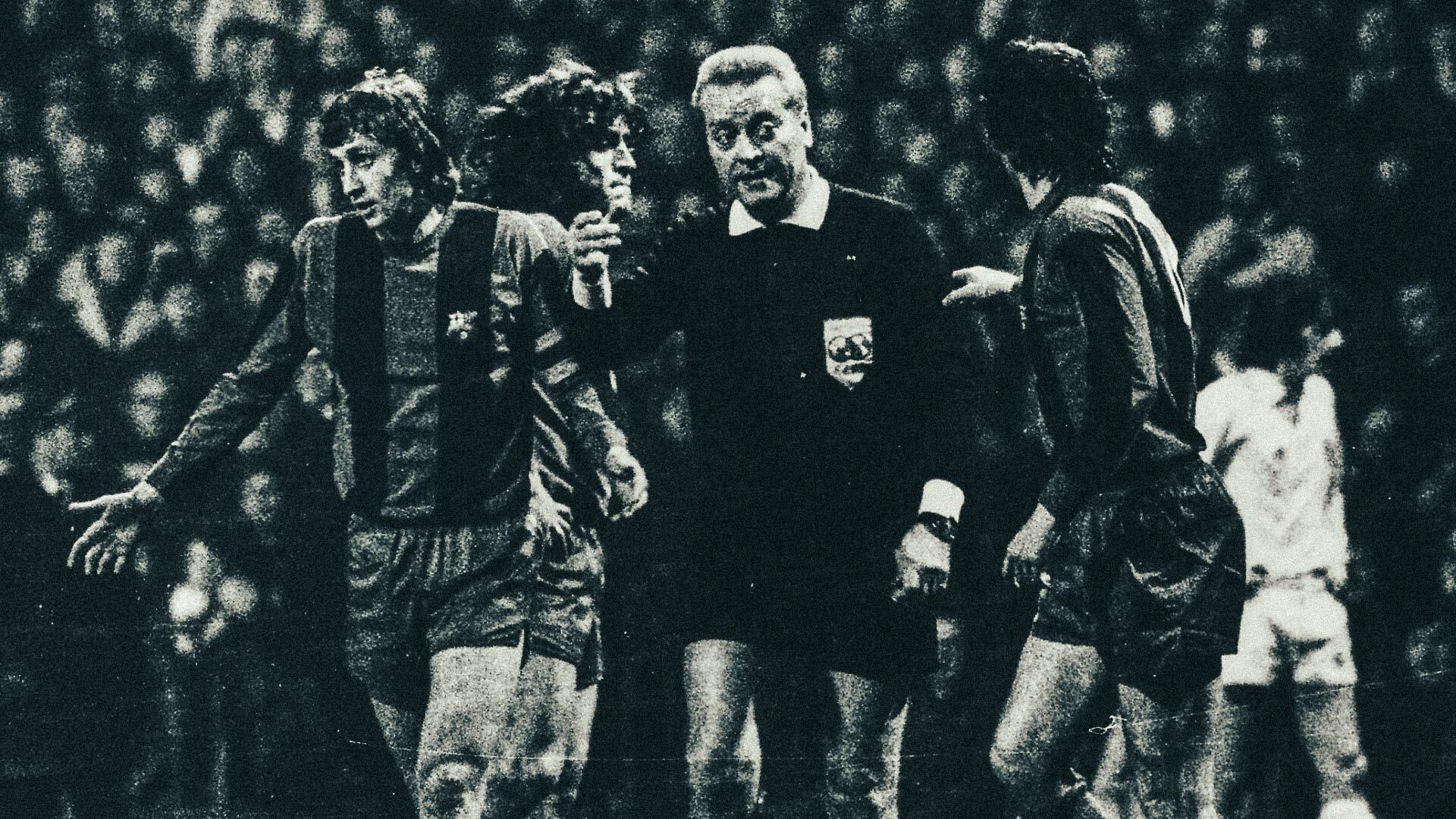European Cup semi-final, first leg 1975: Leeds United 2-1 Barcelona — Square Ball 9/4/75
Faint hearts
Words by: Chris McMenamy
Leeds may have felt magnificent after their dismantling of
Anderlecht in the quarter-final, but a fixture pile up caused by European
football and cup replays meant they had to immediately switch their focus
towards their visit to Kenilworth Road three days later.
Relegation-threatened Luton awaited Leeds in a First
Division clash and Jimmy Armfield made two changes, dropping Allan Clarke and
Billy Bremner for Duncan McKenzie and Johnny Giles. The Anderlecht win had
stretched Leeds’ unbeaten run to eighteen matches in all competitions going
back to mid-December, but they were two goals down by half-time at Luton and
ultimately lost 2-1.
“I’ll be happy with a top four finish now,” Armfield said
afterwards. “It was too much to ask my side to maintain the pace they have been
doing.” Ruling Leeds out of the title race wasn’t a speculative call. They
played another six matches in twelve days before hosting Barcelona at Elland
Road and won none of them, drawing three and losing one in the league, while a
second FA Cup quarter-final replay with Bobby Robson’s Ipswich ended 0-0 and
prompted a fourth tie between the two sides, which Leeds lost 3-2 at the
neutral ground of Leicester’s Filbert Street despite taking a two-goal lead.
Barcelona scouts had been in attendance at Kenilworth Road
and must have left England thinking they’d seen enough. Perhaps hearing reports
of the seven-match run without a win had them writing Leeds off entirely.
Barcelona rested star players Johan Cruyff and Johan Neeskens in their 1-0 loss
to Celta Vigo prior to the trip to Elland Road, where Leeds had just lost 2-0
to Liverpool after two moments of individual brilliance from Kevin Keegan
settled the match. It had been something of a lifeless affair and most
reporters in the press box came to the conclusion that Leeds had not one, but
both eyes on the date with Barcelona four days later.
Bremner played despite being treated for a calf injury,
while Clarke, Giles, and Paul Reaney all missed out. Gordon McQueen returned
after three weeks out with a groin strain and Duncan McKenzie was thrown back
in from the start, having recovered from injury himself.
Just as Leeds’ European campaign progressed to the semi-final stage, separate tabloid stories were published about Bremner’s ‘eye watering’ salary of £25,000 and Armfield’s decision to transfer list him at the end of the season. Whether either story was true or relevant did not matter, the club were in the national media more than any time since the Clough fiasco at the start of the season.
Controversy surrounded the semi-final before the game even
began. The club doubled ticket prices for the one-off fixture, prompting a
complaint to the Prices Commission. There remained such demand for match
tickets that West Yorkshire Police had to call in extra officers to control the
crowds outside the Elland Road ticket office, who had become restless due to
there being only two turnstiles open for what was expected to be a 50,000
sell-out. There was also an air of sadness as news broke that striker Mick
Jones was to announce his immediate retirement in the coming weeks having
failed to fully recover from a knee injury that had kept him out of action for
a year
A Barcelona side led by legendary Dutch coach Rinus Michels
awaited Leeds. Billy Bremner wasn’t best pleased to meet the La Liga champions
at this stage. “If we have to play Barcelona I would prefer it to be in the
final,” he said. “These very experienced Latin teams tend to be cautious and to
concentrate on not losing in two-legged ties. We’d like to catch them in one
match.” While Bremner might have preferred Saint-Etienne, the French side
cruising towards their sixth league title since 1967, he found himself up
against Cruyff and Neeskens. Both midfielders were star attractions in their
own right, having won three consecutive European Cups with Ajax from 1971-73
and inspired the Netherlands to the previous summer’s World Cup final.
Cruyff was the first man to have won the Ballon d’Or three
times, taking the title of Europe’s best player in 1971, 1973, and 1974. The
sporting pages were filled with headlines like ‘It’s Leeds versus Cruyff’,
‘Cruyff magic poses problems for Armfield’, and ‘Don’t be afraid of Cruyff,
Leeds!’
Leeds coach Syd Owen was asked about the team’s plan to deal
with Cruyff. “What are Barcelona going to do about Billy Bremner, Johnny Giles,
and Eddie Gray?” It was a fair point. Barcelona were favourites to win the
tournament, even ahead of holders Bayern Munich. Many believed that the
Cruyff-Neeskens axis would be simply too much for most teams and even stopping
those two would leave Carles Rexach with a free run at goal.
Rexach was the epitome of Barcelona’s ethos. He was born in
the Barcelona suburb of Pedralbes. Rexach grew up a stone’s throw from Camp Nou
and was a proud Catalan. Alongside Cruyff, he was an outspoken critic of
Spain’s fascist dictatorship under Francisco Franco. The club had become a
focal point of anti-Franco protests throughout the past two decades as
Catalunya rebelled against Francoist repression of the region’s culture,
language, and identity.
By April 1975, Franco was seriously ill and there was a sense that change was going to come, that a better future lay ahead as the regime would fall with the death of Franco. Barcelona were not only a great team, they had a purpose greater than football. But they still had to deal with Billy Bremner, Johnny Giles, and Eddie Gray.
Leeds had scores to settle with several Barcelona players.
Five of the team to face Leeds also played in the Fairs Cup Trophy play-off in
1971. The fixture determined who kept the Fairs Cup after it had been replaced
by the UEFA Cup. The first ever winners, Barcelona, took on the most recent
winners, Leeds, in a one-off match at Camp Nou. Teófilo Dueñas scored either
side of a Joe Jordan equaliser to give Barcelona a 2-1 win and meant they kept
the cup.
A petty grievance with Johan Cruyff also meant that Leeds’
midfield would have to ‘deal’ with him as a matter of personal pride. Cruyff
had been on ITV’s coverage of the 1973 FA Cup final as Leeds lost 1-0 to
Sunderland and called out Leeds’ midfield, namely Johnny Giles and Billy
Bremner for not being physical enough to dominate the middle of the Wembley
pitch.
In a tactical column for the Sports Argus before the match,
Don Revie wrote: ‘Cruyff is the most complete forward in the world but Leeds
also have outstanding players. It would be crazy for them to develop a complex
about Cruyff.’ Rather than fixate simply on one player, Revie implored, Leeds
should play their own game. Frank McGhee wrote a long-winded piece in the
Mirror comparing Duncan McKenzie to 1968 George Best on the morning of the
match, warning Jimmy Armfield not to stifle McKenzie’s creativity by playing
cautiously. Armfield took McKenzie out of the equation, choosing to start the
tried and trusted Clarke and Jordan instead.
“This first ninety minutes will be the time and place for
sorting it all out,” said Bremner before the match. “I’ve heard there are a few
faint hearts [in Barcelona’s team] when things aren’t going well. We plan to
put that theory to the test.”
Leeds lived up to their captain’s word. In the opening
exchanges, Frank Gray clattered Carles Rexach, and in the tenth minute Bremner
put those faint Barcelona hearts under strain. Giles floated a pass to the edge
of the box from midfield, Jordan flicked a header behind the defence, and
Bremner smashed the ball past goalkeeper Salvador Sadurní to make it 1-0.
Elland Road had lift off, and so did Leeds. They were playing their own game
and paying no special attention to Cruyff other than dishing out the odd kicking
when Leeds’ supposedly not-so-physical midfield got near him.
Jordan soon had a goal disallowed for handball, his early attempt at the Hand of God not quite as successful nor subtle as Diego Maradona would pull off eleven years later. Jordan could have scored again just before half-time as Eddie Gray’s delightful cross found him in space, but he fired over. The break came as a relief to Barca’s defenders, who were grateful to be losing by only one goal. Bremner trotted off with a knowing smile on his face as the crowd applauded what had been a fantastic half of cup football. Barcelona were there for the taking.
Early in the second half, Toño de la Cruz sparked a brawl by
pretending he’d been elbowed after fouling Eddie Gray. Terry Yorath took
exception and dragged him to his feet, but not before Neeskens and Cruyff tried
to get involved with some pushing and shoving, perhaps a desperate attempt to
channel their frustration with the job Leeds had done on them. Cruyff’s desire
to turn the tie around drove him into acting as an auxiliary sweeper,
intercepting a Bremner one-two in the Barcelona penalty area.
Midway through the second half, Cruyff broke away with the
ball from a Leeds corner and sprinted towards goal before attempting to play
Juan Carlos Heredia in for a certain equaliser, but Paul Reaney made a perfect
covering tackle, or so he thought. The linesman may have been some fifty yards
away but he flagged for obstruction and Barcelona had a free-kick and Leeds’
goal in sight. Cruyff lined up to shoot but laid the ball off for Juan Manuel
Asensi to strike low past David Stewart and into the Leeds goal.
Leeds pressed for a winner and with twelve minutes
remaining, they found it. The unstoppable Reaney came flying forward from
right-back, beating two Barcelona defenders before floating a cross to Jordan
at the back post, whose header eventually bounced and sat up for Allan Clarke.
Sniffer scored, of course. Not one of the 50,000 inside Elland Road thought he
wouldn’t, as evidenced by the deafening roar that encouraged Leeds to go for
the jugular. They continued to attack, Reaney never relenting down the right.
Barcelona were so rattled that they substituted Neeskens just to give
themselves a breather and break up Leeds’ momentum.



